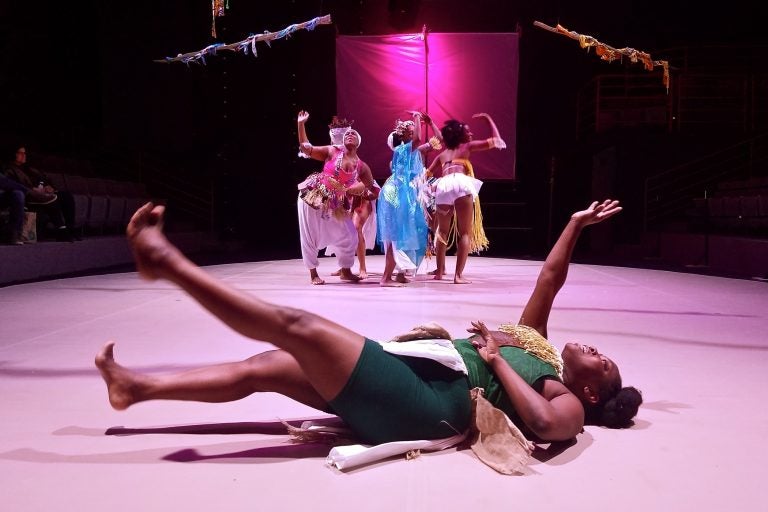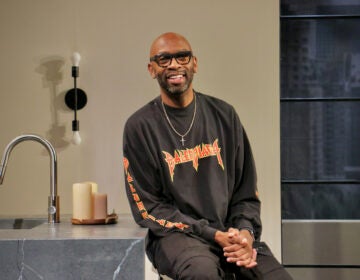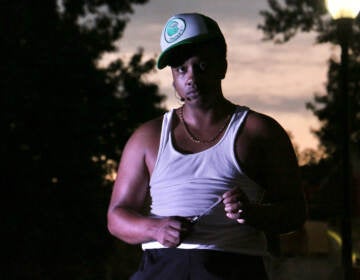Philadelphia theater production of ‘Vessels’ explores the spiritual survival tools for women on a slave ship
“Vessels,” a premiere work this weekend at the Annenberg Center in Philadelphia, imagines how captured African women might have survived the Middle Passage.
Listen 2:10
Six women imagine the hull of a slave ship in "Vessels," at the Annenberg Center. (Peter Crimmins/WHYY)
The stage of Harold Prince Theater at the Annenberg Center, on the campus of the University of Pennsylvania, is set with an abstraction of a slave ship. A mat roughly in the shape of a hull is ringed with hanging ribs, suspended by cables.
“Vessels” is a performance work of sound and movement depicting captured African women journeying across the Middle Passage. There are no spoken words in the piece and no instrumentation, aside from an occasional drum. The audience hears wails, gleeful trills, or bodies moving across the floor during the 90 minute performance.
“It’s not Middle Passage: The Musical, which I think would be a terrible musical,” said Ron Ragin, one of the creators of “Vessels.” “It’s more of a series of explorations in terms of conjuring, invoking survival tools people had with song and dance.”
For the last four years Ragin and his co-creator, Rebecca Mwase, have been working to create a spiritual theatrical experience, informed by ritual practices of African tribes from the region around Ghana.
“The movement and song come from traditions specifically tied to moments in women’s lives: birth, death, menstruation, war, and marriage,” said Mwase, who has been working on this piece. “Those rituals are infused with sonic and movement elements.”
“These are technologies,” added Ragin. “Think of songs as tools. We know that when we sing we change our bodies through those vibrations. We change any space with the resonances.”
“Vessels” is co-commissioned by the Annenberg Center, which has the world premiere this weekend. It is devised theater, meaning it was invented in collaboration with the performers.
Mwase said, in total, 25 women have participated in creating “Vessels” through a series of workshops. In the end, six women are on stage at the Prince Theater, including Mwase, herself. Ragin also contributes some drumming.
Although primarily set in the hull of a slave ship and implying – wordlessly – its horrible conditions, the piece is not unrelentingly bleak. “Vessels” imagines two worlds: inside a transatlantic slave ship, and a second reality of mental escape. The women dance together, weep together, and rage to the darkness. Often madness, elation, and hopelessness exist in the same moment on stage.
“Part of the work we are doing is liberation work,” said Ragin. “How do we get free, even if it’s just for [snaps fingers] a minute. What can we accomplish in that period?”
The piece starts before the audience sits down, in the Annenberg lobby with an altarpiece the audience can explore. A dancer emerges from the theater and wanders through an installation of a a small forest of sculptural ships perched on top of sticks.
The piece is in three acts of 30 minutes, broken up by 15-minute intervals. “We recognize there’s a lot of energy this piece will generate with people, given the subject matter and our intentionality, so we want to give people breaks,” said Ragin.
There will also be an optional audience discussion opportunity at the end.
“The idea was that this piece has a healing intention. The purpose of the work is to heal the people, places, and spaces that experience the Middle Passage,” said Mwase. “Which, when you think about it, is everywhere and everyone.”
WHYY is your source for fact-based, in-depth journalism and information. As a nonprofit organization, we rely on financial support from readers like you. Please give today.





